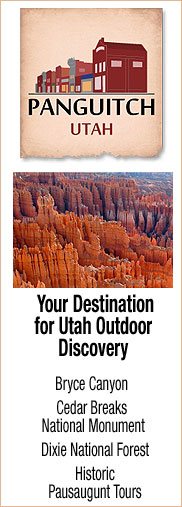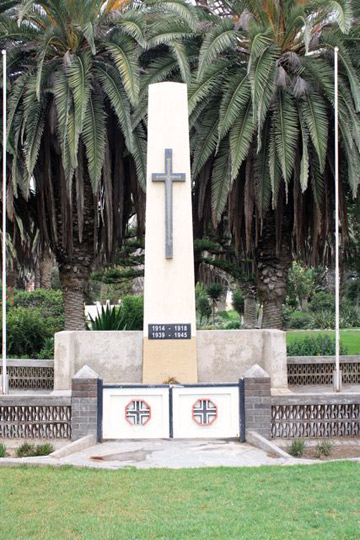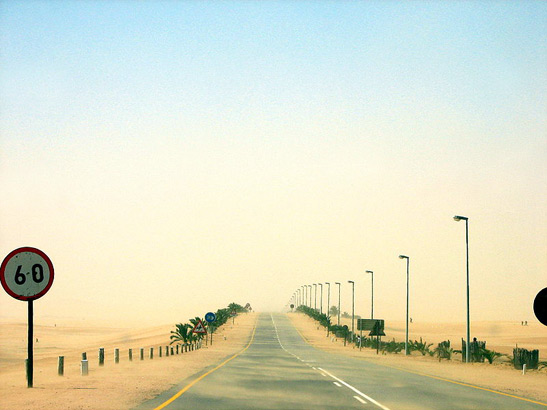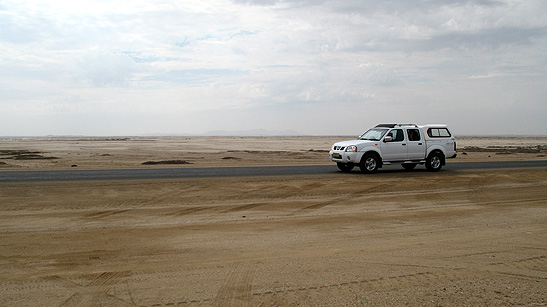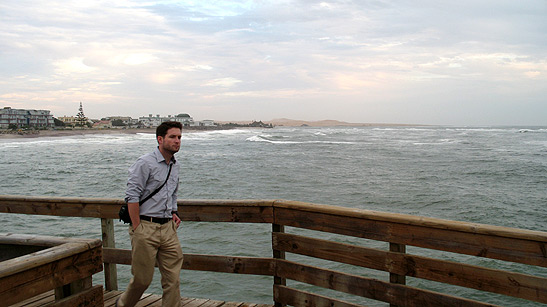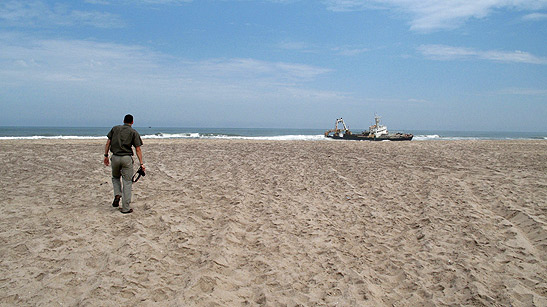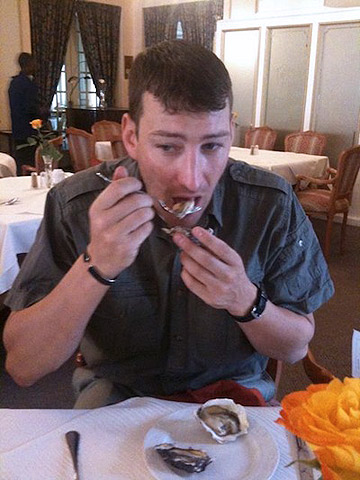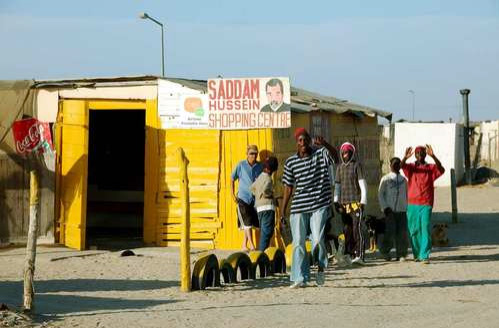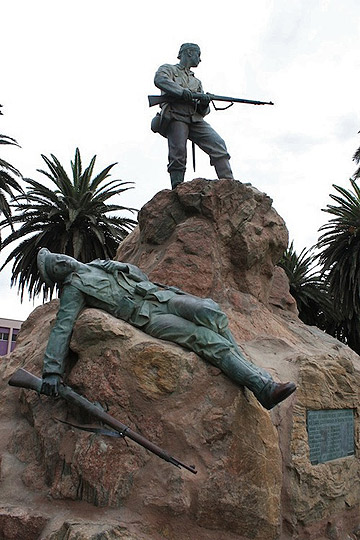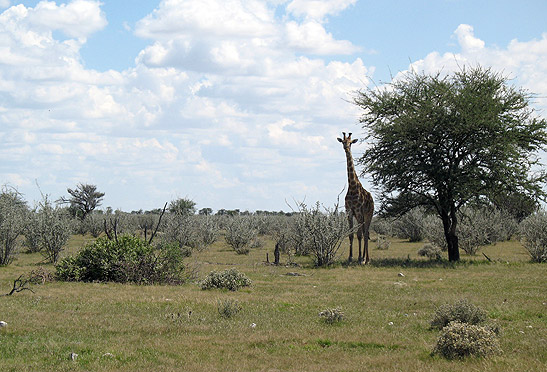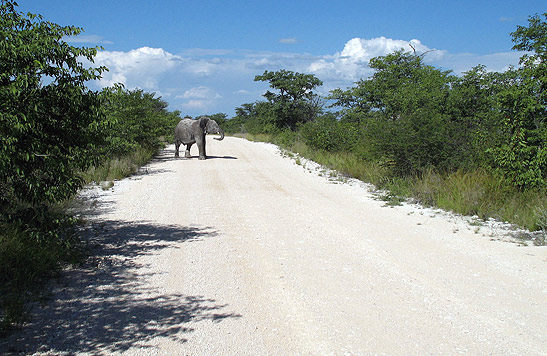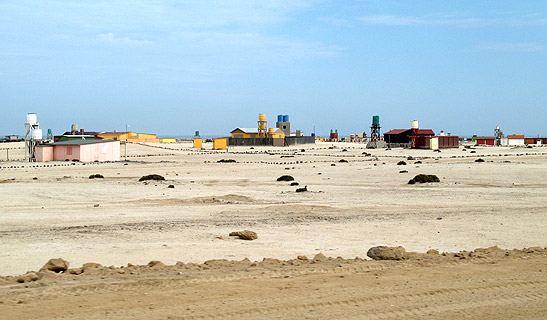 |
 |
|
 |
|
Deutsch-Südwestafrika
JR Ewing, the Great Namibian Oil Boom, and
Welwitschia Mirabilis Just a glance at the odd shape of Namibia on a globe tells you very clearly that you're headed to a very strange place. After Mongolia, Namibia is the second least densely populated country on the planet. It is also famously known as a place where the red-dirt stained Himba tribe live. The women of this clan never wash themselves, even after childbirth, preferring instead as a matter of some manner of aboriginal cleanliness to smear their bodies and hair twice a day with cow's butter and ochre-colored dirt ground from the local sandstones; and wander around everywhere in such a condition in public to this day, as in former times, nearly butt naked. Back in the day, castaways from shipwrecks on the Skeleton Coast would wander soaking wet from the frigid East Atlantic onto the Namibian shores, only to find themselves ironically surrounded by hundreds of miles of parched dune swept deserts, bizarrely populated with elephants, mud-caked dreadlocked tribesmen, and thousand-year-old Welwitschia mirabilis shrubs. A strange expanse indeed. In fact, from times long past, the natives have called Namibia, "The land God made in anger"… an innately understood collective prophecy, to be sure. The Taxi and Car Rental Mafia obviously runs Windhoek, because for some odd reason, they decided to built the airport about 30 miles away from the rather small DownTown. Much conversation was bandied about concerning our situation between John and Dave and I on the long taxi ride to the hotel, and it was discovered that, being from New York City and not needing to acquire this skill, neither of my traveling companions knew how to drive stick, which the 4x4 we'd be renting would surely require. Now I was really in trouble. How could I have misplaced my license right before this trip… when this was my only responsibility…? Unreal. I really couldn't believe it. Eventually it was decided that I would try to rent the vehicle the next day with my passport, and if that didn't work out, John would fill out the paperwork and I would teach him to drive stick in a one day crash course lesson before our trip to the wastelands. A tall order. Complicating matters for John, in Namibia, they drive on the opposite side of the road. Great. "Good times," as Dave would say. We arrived at our hotel in Windhoek, The Kalahari Sands,
quite a bit after dark, to much sketchy activity on the streets outside.
Even so, despite the closely-held affections of the locals for pick
pocketing, and much like our digs at the Victoria Falls Hotel in Zimbabwe,
the queen of England, decades earlier, had also chosen to lay her big
rump down on one of the beds at The Sands for a night or two of dozing
before floating off to the nearby Tintenpalast for exercises in fantasy
governing. Well now, speaking of The Sands and rather deceased individuals…
I know that, uber-regrettably, JR Ewing has been purportedly graveyard
dead for almost 30 years, as was suggested forcefully on the legendarily
popular episode of Dallas known as "Who shot JR?" However,
despite this, a full three decades later, the The Kalahari Sands has
been preparing for and longingly expecting his surely imminent resurrection
for the as-yet-unhappened Great Namibian Oil Boom which is surely currently
desperately requiring his manifest presence. This hospice is indeed
a bizarre mix of upscale German/European/ 1980's hodgepodge interior
design loudly beckoning JR to arise from the crypt with plenty of familiar
scenery skillfully prepared to comfort him; populated by colorful Bergerac-caliber
disciples marching through the lobby in ritualistically anticipation,
their Falcon Crest-esque couture suggesting a cryptozoological conference
in progress somewhere nearby. Complete with a rather overly guarded
small casino near the main entrance, clouds of Benson & Hedges smoke
everywhere, and only occasionally working elevators, the Kalahari Sands
was indeed a feast for the senses. After settling in, we took the two
mile taxi ride to Joe's, a famous local restaurant and bar, for a feast
of zebra steaks, gembock sushi, and Windhoek lager. The zebra steak
that night ranked as one of the best things I've eaten, ever, even if
it was just like eating a striped cartoon horse. Yum. I asked a security
guard at the restaurant if it'd be safe for us to walk back to the hotel
rather than take a taxi again, so as to see some of the local sights
more closely. He said firmly, "No. You will be robbed."
Deutsch-Südwestafrika,
The Second Reich, and Lebensraum The Berlin Conference, or Kongokonferenz, held in 1884, auspiciously set the stage for Namibia's conquest. This bizarre agreement amongst European superpowers demarcated dividing lines for each attendant country in the mad Scramble for Africa. In this decadent land-lust orgy, Germany scored the kingdoms of Togo, Cameroon, German East Africa (now Tanzania, Burundi, and Rwanda), and Deutsch-Südwestafrika, yes… our beloved modern-day Namibia. In contrast to Otto von Bismarck's conservative and somewhat benevolent exercise of kaiserreich years earlier, German settlers of Namibia in the late 1800's had come to embrace a much more inspired and draconian view of colonialism, no doubt encouraged by their arbitrary and surprise new imaginary ownership of Any-New-Land they laid claim on. In addition to this mindset, many new theories had been sweeping through the homeland, further encouraging their rampant terrra firma carnality. Among them in particular, a new concept known as "Lebensraum" had been recently thrust into their mindset by a German geographer by the name of Friedrich Ratzel, a professor at the University of Leipzig, bursting forth from his two-volume (ahem) masterpiece Anthropogeographie. Simply stated, the Lebensraum theory espoused that nations needed progressively and ever-enlarging land space to ensure any possibility of survival. Africa, he argued, was exactly the place for this sort of national expansion. Arriving in their new homeland thus encouraged by aspirations of cultural dominance and entitlement, the German colonists of Deutsch-Südwestafrika arrived to the bleak reality of a land thoroughly populated by proud and dominant native culture. While some of their number, notably German-native and government-instated administrator and governor Theodor Leutwein, embraced an ethos of, in his words, "colonialism without bloodshed," most new-comers absolutely did not. Buoyed by ideals of land-privilege and infected by the recent tendrils of racial superiority theories that had also begun to infiltrate German society during this time, the emigrant population began to take out their pent-up aggression on the local savages. Rape, murder, and generalized abuse of the local Herero tribe began to spread as the settlers attempted to assert their growing dominant presence. Eventually, the Herero decided enough was enough, and in 1904, localized contingents of the tribe struck back against their newly-acquired parasites in the coastal port of Swakopmund, killing about 100 Germans. Relatively few Herero were involved, with the rest going about their business in other parts of the land, but when the news got back to Der Homeland back in Europa, the populace was incensed. At the behest of the Kaiser, a large military contingent was cooked up, armed to the teeth with cannons and the most apocalyptic of modern weaponry, and quickly shipped off to the new threatened offshore colony. The head of this band of locustry was headed up by a man of vicious reputation… and gruesomely named: General Adrian Dietrich Lothar von Trotha.
Trans-Kalahari Highway, Gross Barmen, Busted On our five hour drive to the coastal town of Swakopmund on the Trans-Kalahari highway, also known as "B2," we passed the sparse vegetation typical of chaparral/desert environs of much of the flatlands of southern Africa. Not far along the way, we happened upon a sign at an intersection stating that a few miles to the south of us was a town called "Gross Barmen." Now I don't know what kind of genius city planner is living over there in that neck of the woods, but he's long overdue for the Nobel Prize in Literature. Gross Barmen. Right on. Enough said. After this, we soon found that distances driven between the small towns scattered through the Namib desert are considerable indeed, with much road construction along the way. The country is so enormous, the highway workers didn't even go home at night, but lived in makeshift tent camps sporadically placed along the roadside. I believe one was called "Hyena Bait Camp." Or maybe they all were. Occasionally, we would drive through a small town that looked a dusty old west American ghost town set up as an attraction on the outskirts of a traveling Swiss circus. A few of these towns had quite a few people wandering about, but a number of them, notably Usakos, turned out to be conspicuously devoid of humanity. Weird, man. It reminded me of Carnival of Souls. Staying in the truck sounded like a really good idea. Throughout the day, John and I had been trading off at the wheel, and about an hour away from Swakopmund, it was my turn. Driving on the left side of the road turned out to be big strange fun indeed, and when the surface wasn't ground down to gravel by the road crews, a lot of driving really, really fast could be accomplished. At one point in the journey, I rounded a corner clinging sharply to the to the edge of the pavement, and came within inches of pancaking a gecko that was bravely sunning himself on the pavement. As I passed at 75 miles an hour, I saw him in my rear view mirror, resolutely holding his entrenched position. While driving, I was essentially still trying to be careful seeing as how I didn't have my driver's license and could potentially get into a lot of trouble in Africa (of all places) if I somehow got pulled over without it, but the closer we got to our destination after all of the sceneless/scenic driving of the day, especially without seeing scarcely a cop, I was driving pretty fast, quite ready to feast my eyeballs on a long stretch of Liverpool v Stoke City on the hotel TV. Just about 15 miles from our our hotel, I have some sort of derelict memory of hurtling around a corner near a small town passing a yellow sign with a lower-spectrum two-digit number on it. Immediately after negotiating that corner on two or three wheels, I saw a dude ensconced in a uniform of some sort standing in the middle of the road with a fat Jetsons-style gun in his hand waving me over to a small tent about 40 yards off the road. A Namibian cop. Busted. So now my pulse is "mildly elevated," because I know beyond the shadow of a doubt because I'm speeding, as usual, but this time in a foreign country. I was already told by the rental agency people that I couldn't drive in Namibia because I didn't have my license, and because of this specifically by law wasn't allowed to drive their vehicle. And now here's an African cop ordering me out of the truck and marching me towards a tent where yet another policeman was waiting at a makeshift desk. Dave and John were instructed to stay stay put, and during the long walk up to the wigwam, I just decided to relax and go with it. With that thought, a few bars of music started mercifully began filling my mind, which I soon auspiciously identified as National Geographic's theme music to "Locked up Abroad."
The Annihiliation Order, Bavarian
Backlash, and Backlashings While he blithely anticipated the subsequent and inevitable Herero starvation in the 120 degree wilderness, the General penned what was later to be known as "The Annihilation Order." In it, he stated: "I, the great general of the German soldiers, send this letter to the Hereros. The Hereros are German subjects no longer… The Herero nation must now leave the country. …Any Herero found inside the German frontier, with or without a gun or cattle, will be executed. I shall spare neither women nor children. I shall give the order to drive them away and fire on them. Such are my words to the Herero people." In a flourish of generosity, von Trotha eventually instructed his troops not to kill the Herrero women and children, but instead, told his men to shoot at them so as only to scare them away, adding, "The troops will remain conscious of the good reputation of the German soldier." Let history ever witness as a testimony. Meanwhile, back at the ranch, news of this dire situation began to filter back to The Taxpayers. When the German citizenry in Weinerschnitzel Paradise heard about Lothar Von Trotta's Kalahari Herero Barbecue Adventures, they were aghast. Even for German society during this time, including politicians at the Reichstag, all of whom had enthusiastically sent this expeditionary army off into future Gleiwitz glory, the news of Lothar von Trotha's exploits was appalling. Major protests were mounted against this furious evil, among commoners and bureaucrats alike. Tellingly for the future concept of three or four Thousand Year Reichs, even with this mounting tide of popular dissent, the Kaiser did not instruct von Trotha to annul his Annihilation Order for yet another two months. Subsequential to this surely begrudged renunciation, the Hun expeditionary force rounded up the remaining Herero that were still surviving in the badlands, about 15,000 hardcore of them all. After hunting them like animals for months, the Schweinhunds told the natives they were pardoned and would be free return to their homes. Sickeningly, within walking distance of our exalted digs at JR Ewing's African Palace, as we slept amongst our snoozy comforters, there was founded just subsequent to this eternal lie, one of the first modern conveniences of the 20th century, what we now commonly know as a concentration camp. Thousands of emaciated indigene were brought to their new homeland in Windhoek in railroad cattle cars. (Ahem… sound familiar?) About 3,000 more were sent in a similar manner to Swakopmund, Germany's exclusive Namibian port and epicenter of then-modern commerce. While in these Social Paradisos, surely exactly similar to the freedoms they were earlier promised, the Herero were assigned numbers, attached to their necks amongst chains by metal assemblages similar in shape and size to modern tags affixed to the collars of dogs. As the army ran out of uses for these slaves in the ports and forts of German South West Africa, they began to rent them en masse to local German corporations. (Hmmm… also sound familiar? Schindler's list anyone?) These upstart companies in fact, were allowed to run their own concentration camps. Records currently residing in the Windhoek archives document thousands upon thousands of Herero deaths in the pursuit of Deutsch empire building, most through exposure to exhaustion, starvation, and cold. (Wow, the familiarity here is almost palpable, nein?)
Swakopmund, International Police
Bribery (again), and Advocaat "Yeah dat not good. Driver license please. And passport." Great. Now I had to bust out the brilliant excuse I'd invented only moments earlier for this truly unlikely contingency. "I don't know where my license is, sir, I think I may have left it in the hotel room." "Oooooooo," he breathed gravely. "You need license to drive car in Namibia. That no good. No good all. What you doing? You take holiday?" I started rambling about what we'd done in the previous week and what we were going to do the next day, etc, and he interrupted me. "Where you go now?" Having basically just arrived in Namibia, Dave and John and I had no idea how to pronounce "Swakopmund," nor did we care. We came to discuss this place as "Swampland," and after struggling for a second to answer the cop, I told him: "Swamp-ox-land," or something very close to it. At this, both policemen pitched their heads back and howled in laughter. Whatever word I used they found massively entertaining indeed. I sat in silence with a palsied smile as their roar subsided to a hearty chuckle. After this adventure in mangled semantics, it was clear that the ice had been broken, and we joked back and forth for a minute about what I'd said before their attention turned back to the fact that I was a tourist, and didn't have a license. "If we write ticket, you go home. Never pay. Ooooooo, no good," argued the first cop. Massively relieved now that they were only talking about giving me a ticket rather than taking me down to the station for a night in jail or some such lame inconvenience, I think I emphatically promised them I would pay the ticket once or twice before I finally sensed the opportunity I probably should have apprehended a few decades earlier. With the particular strain of conversation they were engaging me in, I realized they might be fishing for a bribe. Delicately, I suggested: "Hey, how about I give you all the money in my pocket and you just let me go right now." "Oooooooo," he said in just a bit of a different tone, turning to look me straight in the eye… "How much you got?" I quickly pulled out all the money I had in my pocket, which turned out to be about $280 Namibian dollars… around $40 US boneskees. I handed it to the first cop, expecting him to somewhat diplomatically place it on the table or in an envelope, and perhaps jot down a few notes in a feigned display of show to make it look like, even if just perhaps, the money might be going into the local jurisdiction's coffers. Instead, with no one but the three of us around for miles, he kind of hunkered down a little bit, looked over his shoulder quickly to the left and right, and shoved the whole wad of cash into the right front pocket of his pants. After witnessing this magnificent adjudication, I immediately chirped: "I'm free to go?" "Yes, free to go," he replied with a smile. Without further ado, I stood up and started back towards the truck. "Have a great trip!" one of them yelled with a laugh as I beelined down the hill. "Thanks!" I said loudly, without looking back. "Yes, have a great trip!" I heard the other say, chuckling. I was so relieved to be extricated from this sticky situation, that I simply hopped back into the driver's seat again and drove off, forgetting that was the reason I was there in the first place. I guess I had paid for the privilege. After checking into our hotel in "Swamp-ox-land,"
The Hansa, we took a quick stroll out onto the pier to stare out into
the awesomeness of the cold and vast tempestuous south Atlantic Ocean,
and ended up in the hotel's amazing restaurant a little later, where
I devoured the delectable remnants of a warthog and ostrich, and watched
Dave "roll the dice," as he aptly stated, throwing down his
hatch some local African oyster shooters. Scary. Amidst pods of German
tourists chatting away in their native tongue, we feasted on several
courses of various local foods like kudu and ostrich, drained numerous
bottles of South African beer, and polished the night off with a round
of Advocaat. We then headed out to the check out the local late night
scene, and ended up at Africa's version of an Oakland hoochie mama bar,
wading along the way through occasional roving bands of emaciated prostitutes
and pseudo street gangsters, with whom Dave would quickly engage with
his very entertaining brand of wry and lively international discourse.
Eventually stumbling upon Kücki's, a Berlinsk-Namib pub for locals
of European descent, we closed out the night draining glasses as true
foreigners amidst the chatter of Afrikaans; ancient colonial maps and
photographs staring down at us from the walls above.
Eugen Fischer, Franz von Epp,
and The Ending of All Somehow, despite German homeland idealism and the sure progress of humanity that was developing quickly overseas; inextricably, by 1908, the concentration camps in Namibia were shut down. Of the native populace, at least 70% of the Herero were dead, and 50% of the Nama also had gone the way of Mauthausen-Gusen. It was now that the Germans were firmly in control of their new little blood-stained paradise of Lebenamibia. After World War I, a Great War and former Deutsch-Südwestafrika campaign veteran by the name of Franz Ritter von Epp formed a paramilitary group in Munich by the name of Freikorps Epp, from which future SA commandant Ernst Rohm became leader. During this time, von Epp also helped developed the ideologies of two other former WWI soldiers… Rudolph Hess, and Adolph Hitler. Undoubtedly inspiring Hitler's budding Nazi ideology with tales of The Witchcraft performed in the name of the Second Reich in Namibia, of von Epp, Hitler stated: "I learned to speak through him." Soon a fixture in Hitler's upstart regime, von Epp was eventually promoted to Reichskommissar of Bavaria, a lofty territorial governing position that came with nearly absolute power. Meanwhile, Eugen Fischer, the Shark Island eugenics vampire-in-residence, was appointed by Hitler as head of the Kaiser Wilhem Institute in Germany during WWII, where he would regularly receive body parts from Auschwitz for his continuing eugenics research, sent along by his contemporary and protege, Dr Joseph Mengele. Currently in Namibia, 75% of the arable land is owned by around 4,000 farmers of mainly German descent. These farmers make up less than 5% of the total populace. Descendants of the Herero, by and large, live in slums. Several of those that we saw are immediately adjacent to Swakopmund and Windhoek, where the impoverished family line continue to serve as laborers for the local shopkeepers and store owners. These Inheritors of Peculiar Destiny can be seen daily in Swakopmund, walking into town from their ramshackle tenements, crossing the very railroad tracks that brought their ancestors there in chains, a hundred years earlier. Their grandparents are buried nearby, and if you like, you can seen their unmarked graves right now, by the thousands. A simple entry of "Swakopmund, Namibia" in the Google Earth search field will quickly bring the town to your view. Just south of the bulk of the small city, below the tiny suburb of Kramersdorf, lies a massive field of lumpy shallow graves, conspicuous in the barren desert. There are several more of these cemeteries on the periphery of the town, north and south, you can find them easily if you look….the city is built on them. A century later, they still cry out to the sky.
Wlotzkasbaken, Maggot Rolos,
and The Staring Eyes of the Sky We eventually reached Henties Bay, which would be our turning point inland for our many hours of driving that day through the vast Namib Desert on our way to the Toshari Lodge, our overnight destination. The Namib is considered to be the oldest desert on the planet, and assessed by some fancy scientist or another to be 500 billion-kajillion years old or something like that (maybe more like 5,771 years old?), but you know… like really, really old. Now, a super strange thing about the road we were traveling on is that it was almost perfectly straight for over 40 miles. I am not exaggerating. A peculiar and awesome effect of this ingredient, combined with the flatness of the surrounding landscape and the heat of the day, was that the road ahead of us trailed off into a massive shimmering mirage, as did the telephone lines attending it. It was as if we were simply driving off the edge of the earth into the ether, where reality breaks down into its invisible spiritual components. As we approached the small town of Uis, a few Himba and Herero stood at their utterly pitiful roadside structures and waved for us to come have a look at their wares… bracelets and woodcarvings, and the like. If a camera was produced to capture the sight, they would duck and cover. Strangely enough, just before we got into the small, our windshield was treated to a tiny smattering of the quarter inch of rain the Western Namib receives each year. That's right I said, a quarter inch a year. The droplets peppered our windshield, but not enough to turn on the wipers. John and Dave were keen to have lunch in this town, but not being very hungry at that moment, I sat with them for awhile having a grape-drank, or something like unto it. At some point during this meal, the owner offered us a free "appetizer" of dried grubs; yes, those kind of grubs. They was utterly reprehensible, virtually inedible, and I ended up going outside to spit out its filthy aftermath out onto the ground, where it surely done-belonged from the get-go. Soon after, I crossed the street to a gas station to have a look around, and much to my utter amazement and delight, I actually found some Rolos on the rack; yes, that delicious chocolate and caramel treat. "Just the recipe to cleanse my palette of that wretched caterpillar abortion I just ate," I thought. I purchased the Rolos and greedily tore them open, threw one into my mouth, and started chewing. Yum squared. However, something caught my eye as I strolled out of the store with them. Back in the sunlight, I looked down at the second Rolo, still in the package, only to see a few tiny holes in it, with a small white worm of some sort writhing around on top. Immediately spitting the contents of my mouth onto the ground, in a remarkably similar fashion to just about five minutes earlier, I marched inside the store past the security guard, and told the cashier what had just happened. Ascertaining that she didn't speak much English, I pointed to the Rolos and stated loudly, "Worms!" while throwing the candy into a nearby trashcan with a flourish. As I headed out of the store, I ran into Dave, who was on his way inside. I briefly explained what had happened and trudged back to the truck, to the sound of his chuckling. When Dave returned from the gas station, he told me the security guard had dug the Rolos out of the trash and was eating them. The drive for the rest of the day was a truly wild-west style adventure, with endless dirt roads and stream crossings, and all the driving-as-fast-as-you-like that you could ever have wanted. In Namibia, you get a great sense of freedom, the kind that America's first settlers showed up for, but which has since been utterly crushed under the weight of our monstrous system of bureaucracies and thoroughly disgusting and increasingly degenerate Rules Factory: The United States Congress. Still temporarily exulting in this newly-found sense of liberty, we eventually ended up at Toshari, a totally worthwhile hotel way, way out there somewhere in the endless chaparral. Inside my small but totally cool cabin, I found a massive spider hanging out on the inside of my bed's mosquito netting. Right on. I chased him into the bathroom and put my flip flop on him, as a sort of experiment. The next morning, he was gone. With that disconcerting thought, we headed off to Etosha National Park in northern Namibia. In the midst of the park is a sort of resort, where we decided to have lunch. Just after eating the carefully inspected offering, I climbed the stone turret built in the middle of the compound, and from some distance, witnessed a lion or a cheetah or some bitterly fast animal kicking up a supersonic dust trail while chasing a gazelle or some such other victim beast. Wow. Way cool. We drove around for quite some time seeing a multitude of animals: Elephants, lions, giraffes, kudus, gazelles, zebras, wildebeest, ostriches… pretty much every African animal you could hope to see, ALL of which I wanted to saddle up and ride for a minute; then dismount and shoot, and then roast over a fire with a lot of Heinz 57, and then send whatever remained to the taxidermist. That night was almost our last night in Africa, and during dinner, back at the Toshari, we were treated to the amazingly complex sounds of the locals singing in the multitude of layers, cross-rhythms, and bell patterns characteristic of west African songcraft. Totally remarkable. The owners had announced that these were natives who worked as kitchen staff at the lodge and had come up with the idea to sing for tips to make a bit of extra income. After dinner, I went back to my cabin and stared out into the unfamiliar dark sky of the Southern Hemisphere with the songs of the locals still echoing through my head and heart. The stars were like thousands of pairs of eyes which had seen all of this before. They stared back at me, examining everything. 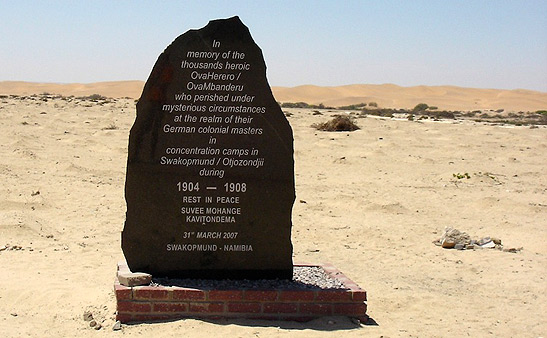 (Photo credit: Alex Mank) Related Articles: |
|
![]()
Stay tuned.
This site is designed and maintained by WYNK Marketing. Send all technical issues to: support@wynkmarketing.com



